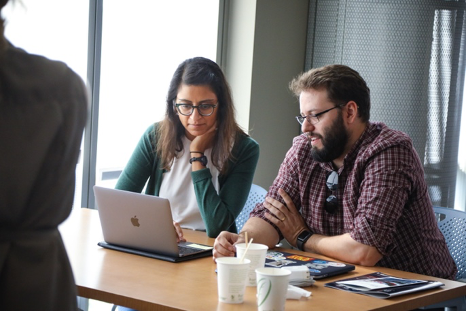
In today’s research world, interdisciplinary collaborations are more important than ever. Additionally, it is widely recognized that one of the most challenging aspects of clinical trials is ensuring sufficient enrollment.
Our program is a collaborative resource for investigators seeking to identify and enroll patients for clinical trials. It is a program of the Duke Emergency Department Acute Research Team with a track record of success.
What differentiates our program is that we have experienced research program with standard procedures to improve the quality and efficiency of clinical trial enrollment.
Why Recruit in the Emergency Department?
Our enrollment team starts up when yours shuts down.
- Patient arrivals to the ED peak in the evening hours.
- We have coordinators screening and enrolling during these hours.
Gain access to potential research participants.
- We see patients who have no other contact with the medical system.
- We see patients for a diverse array of emergent and non-emergent conditions.
- We see patients with co-morbidities unrelated to the reason for their ED visit.
- The ED is a setting where patients whose medical problems are refractory to initial treatment and those who have acute complications of treatment are frequently seen.
- We sit at the transition between the inpatient and outpatient settings, and thus see patients being treated in both.
- Patients often bring family members, who represent a population of healthy controls.
- We see a demographically diverse population not seen in other settings.
We see patients before you do.
- We encounter patients before any potentially exclusionary interventions have taken place.
- As the point of first contact, we can identify patients as early as possible for studies with time-sensitive enrollment protocols.
We can follow-up patients too.
- We have extensive experience in obtaining both phone and in-person follow-up on study patients at high rates.
- We have the infrastructure to conduct follow-up interviews and basic tests in the ED.
How it Works
Our program employs highly trained, full time research coordinators and a variable number of additional research staff. The team has performed many different studies, from diagnostic to therapeutic randomized trials. They can perform blood draws, sample processing and storage, and administer study medicines.
Scalable Involvement
Our coordinators work with principal investigators in a variety of roles from study conception all the way through to database closure. Choose “a la carte” services or fund a portion of a coordinator’s effort.
- Budgeting
- IRB submission
- Feasibility assessment
- Screening
- Enrollment
- Consent
- Protocol initiation
- Patient Follow up
- CRF completion
An Emergency Medicine faculty co-investigator can assist you with your trial by providing insight into the acute care process, helping you identify patients, and connecting you to key ancillary staff who can screen patients. They can also act as the "local champion" for the study, educating or in-servicing staff and ensuring that protocols do not interfere with usual care processes.
Collaborate With Duke EM
To collaborate with us, please contact Vice Chair for Research, Alexander Limkakeng, MD, MHSc (alexander.limkakeng@duke.edu).
We can work together on a fee schedule that fits your study's budget. Find out why many of our colleagues are exploring the benefits of collaborating with Duke Emergency Medicine.
